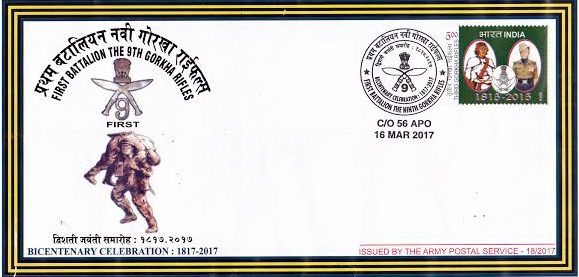 This year the First Nine Gorkha Rifles celebrates its bicentenary and it is natural that we remember all the men who contributed to make this Paltan one of the very best in the world. Every soldier has a ‘Hero’ in his life, a person who made the maximum impact on his life. Our Platan has no shortage of decorated soldiers who did us proud. But I believe that success in battles is a result of the collective effort and even the smallest clog in the giant wheel plays its part.
This year the First Nine Gorkha Rifles celebrates its bicentenary and it is natural that we remember all the men who contributed to make this Paltan one of the very best in the world. Every soldier has a ‘Hero’ in his life, a person who made the maximum impact on his life. Our Platan has no shortage of decorated soldiers who did us proud. But I believe that success in battles is a result of the collective effort and even the smallest clog in the giant wheel plays its part.
My ‘hero’ in professional life is a humble ‘Masalchi’ who served in the paltan nearly 48 years ago But more than a personal recollection and nostalgia, it is an attempt to dispel the gladiatorial image of modern war and remember the silent worker bee!.
Nearly 49 years ago, when I joined the first nine Gorkha battalion of infantry, I was taught that knowing your men was the first important step of leadership. But there was a major problem here. Like the Sikhs have predominance of Sher Singhs, the Marathas Shivaji and Tanaji, the Gorkhas have, in each unit, at least a dozen each of Sher Bahadur or Bhim Bahadur. With this, remembering Jawans by name was impossibility. The Gorakhas have found a unique solution to this problem. Not just the Jawans amongst themselves, but even the wives refer to their husbands with the last two digits of their army number!
99 Namgyl was a masalchi/cook in the officer’s mess. I soon learnt that he had a running battle going on with another (more talented) cook, Baburam , who had superseded him. In the times of peace, a battalion’s reputation is made as much by a good cook as by brave deeds during war. Havaldar (Sargent) Baburam was therefore a favourite of the Colonel. Namgyl refused to accept that and would invariably pick up a scrap with Baburam, specially after he has had his quota of rum. As an end result he would land up on the punishment square, jogging for hours with heavy loads. This is normally how army deals with minor offences. This punishment was always carried out at night, after Namgyl had done his job in the cookhouse.
It was one cold December night in Kashmir, many years ago, when going back to my room after dinner, I found Namgyl at his usual routine of punishment. I happened to be a duty officer on that day and one of the job involved was seeing off the Jawans going on leave, early morning. The next day as I reached the departure point, where the army trucks were waiting to take the `leave party’, I spotted Namgyal. After asking other Jawans about their leave plans and problems, I turned to Namgyal. When I asked him as to how many days leave he was going on, I was stunned by his answer. 99 Namgyal cheerfully replied that he was retiring that day and going on pension!
Even years after the event, the scene is fresh in my mind. Here was an ordinary Jawan, who till the last day of service not only did his job, but even his quota of punishment! This devotion to duty is something that I never forgot. For me Namgyal’s place is no less than any hero in my life. The lesson taught by him went home and throughout my service, even while about to go on leave, I made sure that I worked to the very last moment. It often took my superiors by surprise, they often told me that I should stop the work and get ready for leave. But such was the powerful impact of memory of Namgyal that I always turned down this suggestion.
Later as a company commander I kept a placard on my table “Have I earned my salary today!” to remind me of 99 Namgyal. I even had the same message placed on the entrance to the Jawan’s langar. The reason for recalling this story now is to remind Indians that there are many such unsung Namgyals in all walks of life and it is they who have made sure that India has survived for the last 70 years it is worthwhile to recall the Namgyals in our midst. How many of us can measure up to the standards set by Sepoy Namgyal?
India is currently going through two major revolutions simultaneously. On the one hand we are going through the process of industrial revolution while major social changes are also taking place. India is catching up with the West in double quick time. The stagnant caste system and feudal ethos are being upturned and are being replaced by egalitarianism. This process is churning up the society as never before. The armed forces are no exception to this rule. But what is important is to preserve the values that make an ordinary human being a great soldier.
The sad part is that both the media, as well as people in general tend to focus their entire attention on the negative, while the `little’ men and women, who are the real pillars of the society, are ignored and forgotten. It is time that the record is set straight. It is the presence of Namgyals that has been responsible for the progress we have made since independence.
India always had these `little men’ in abundance, at all times. How else can one one explain the marvel of the Kailash temple cave at Ellora. By a conservative estimate, it took 200 years to complete. When the first sculpture was begun and the first artisan put his chisel to the granite stone, he knew that he was not likely to see the end result of his labour. But if on that pretext he would have not worked, we would never have had Kailash, that masterpiece of Indian architecture.
Nation building is a slow process, one may never see the results in one’s lifetime. Remembering the unknown artisans of Kailash and men like 99 Namgyal, can we, the better off, not chip in with our little chisels?





A small but great lesson. We all tend to get relaxed days before the leave starts. And govt officials stop working weeks before their retirement. We must keep working till the very last moment, play our little part- no matter how small or insignificant it may appear.
And author is right that everyone is just talking about negative aspects. There is more negativity or hatred on virtual world or social media world than on the streets. Thanks to author bring out something little but great deed by a humble soldier.